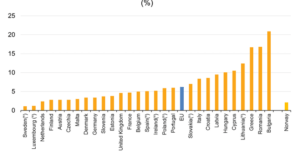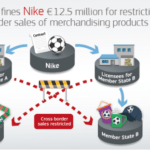In 2018, 6.2 % of the population or around 31 million people in the European Union (EU) were severely materially deprived. This means that they cannot afford at least four of the following items, which are considered by most people to be desirable or necessary to lead an adequate life: pay their bills on time; keep their home adequately warm; face unexpected expenses; eat meat (or fish or the vegetarian equivalent) regularly; take a one week holiday away from home; a TV; a washing machine; a car; a telephone.
The 2018 data reflect the continued downward trend in the proportion of people severely materially deprived in the EU since the peak of 9.9 % in 2012.
Single adult households are most affected. The rate of severe material deprivation for households with only one adult is 9.1 % if the household has no dependent children. It stands at 13.2 % for a household comprised of a single adult with children. For households where two or more adults are present, the rates are significantly lower: 4.4 % without children and 5.7 % with children.
Overall decrease in severe material deprivation
On average the severe material deprivation rate in the EU decreased by 0.4 percentage points (pp) in 2018, from 6.6 % in 2017. Similarly, in most of the countries for which 2018 data are available, the severe material deprivation rate decreased compared with 2017. The exceptions are Finland, where it increased by 0.7 pp, from 2.1 % in 2017 to 2.8 % in 2018; France, where it increased by 0.6 pp, from 4.1 % in 2017 to 4.7 % in 2018; the United Kingdom, where it increased by 0.5 pp, from 4.1 % in 2017 to 4.6 % in 2018; and Denmark, where it increased by 0.3 pp, from 3.1 % in 2017 to 3.4 % in 2018. The largest decreases were registered in Bulgaria (from 30.0 % in 2017 to 20.9 % in 2018, or -9.1 pp), followed by Greece (from 21.1 % to 16.7 %, or -4.4 pp) and Hungary (from 14.5 % to 10.1 %, or -4.4 pp).
More Information
Access to the Full News







Leave a Reply